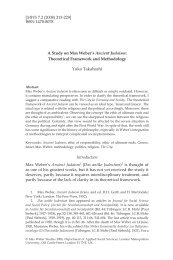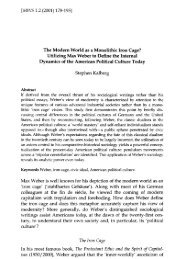Disenchantment, Enchantment and Re ... - Max Weber Studies
Disenchantment, Enchantment and Re ... - Max Weber Studies
Disenchantment, Enchantment and Re ... - Max Weber Studies
You also want an ePaper? Increase the reach of your titles
YUMPU automatically turns print PDFs into web optimized ePapers that Google loves.
18 <strong>Max</strong> <strong>Weber</strong> <strong>Studies</strong><br />
On the other h<strong>and</strong>—<strong>and</strong> regardless of whether or not one accepts<br />
the triumph of science—there is very little evidence for the decline of<br />
magic, anyway. Superficially, of course, this does appear to be the<br />
case. Most of us, for example, no longer seek the curing powers of a<br />
wise-woman or a cunning-man if we are ill. We go to our doctor. Or,<br />
at least, most of us go to our doctor first: the certainties of scientific<br />
medicine are routinely challenged by everyday explanatory frameworks<br />
such as fate or luck (institutionalized in astrology <strong>and</strong> the like),<br />
by increasing resort to the alternative treatments which are colonizing<br />
some of the spaces previously occupied by ‘conventional’ medicine,<br />
or by scepticism <strong>and</strong> refusal deriving from a variety of sources. And<br />
whether the trust which we place in scientific medicine differs radically<br />
from the faith which our forebears had in their available remedies<br />
is another matter, a point which in some respects <strong>Weber</strong> himself<br />
seems to have understood (Gerth <strong>and</strong> Mills 1948: 139).<br />
More generally, one can point to a wide range of substantial (re)enchantments<br />
which are decidedly modern: religious fundamentalism,<br />
whatever its hue; alternative life-styles, many of them explicit resistances<br />
to urbanism <strong>and</strong> capitalism; neo-paganism <strong>and</strong> other invented<br />
spiritual traditions; <strong>and</strong> psychoanalysis/psychotherapy. More transient—even,<br />
one might say, superficial—are such minor (re)enchantments<br />
such as the dreams of alterity inspired by tourism, particularly<br />
in its self-consciously alternative modes; the mundane daydreams of<br />
advertizing <strong>and</strong> consumption; cinematic escapism; science fiction <strong>and</strong><br />
fantasy; <strong>and</strong>, not least, the virtual attractions available on the internet.<br />
The list is long if not actually endless. Many of the enchantments on<br />
it are rooted in desire <strong>and</strong>/or playfulness, however one might define<br />
either of those apparently very human impulses. And neither desire<br />
nor playfulness are necessarily at odds with the schemes <strong>and</strong> strategies<br />
of organized, utterly rationalized <strong>and</strong> disenchanted, capitalism:<br />
witness the National Lottery, <strong>and</strong> television shows such as Who Wants<br />
to be a Millionaire?. We are back to disenchanted enchantment again<br />
(Ritzer 1999).<br />
Apropos sleight of h<strong>and</strong>, if not actually magic, <strong>and</strong> in its own way<br />
no less related to desire—why else does it seem to be so intertwined<br />
with sex?—politics, in particular, continues, as it probably always has,<br />
to generate secular enchantments in the shape of futures (if not<br />
utopias), ideologies, rituals, symbols, myths, dark fantasies, heroic figures,<br />
<strong>and</strong> demonic enemies. To pluck out of the air some more <strong>Weber</strong>ian<br />
themes, legitimate domination is often, perhaps even always,<br />
underwritten by at least a modicum of enchantment, charisma is<br />
utterly enchanted, <strong>and</strong> power has always cast its own spell.




